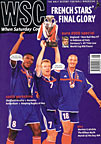 Football League clubs will get a big cash boost from their new TV deal. But they should have paid more attention to the quality of the coverage, says Roger Titford
Football League clubs will get a big cash boost from their new TV deal. But they should have paid more attention to the quality of the coverage, says Roger Titford
One of the most frequent complaints of fans of Football League clubs is the lack of publicity given to their club and, indeed, their whole League. Under the current TV deal the Premiership has been able to monopolise the interest of the media and the casual fan. Indeed the Premiership has been so successful in creating a “distinct brand identity” that it is now almost covered as if it were a separate sport.
When it came to negotiating a new deal, the Football League clubs should have been pursuing not only money to restore their strength but also some status and widespread free publicity from their media partner (that is, terrestrial highlights at a time more accessible than 1am on Tuesdays). The new contract gives them some of the former but not much of the latter.
The 72 clubs’ TV take will quadruple in 2001-02 from £26 million to £105 million a year for the next three years. A typical Second Division club will now receive in the region of £1.2 million. Given that total turnover for clubs in that division is typically somewhere between £3 million and £7 million, this is a sizable uplift. The deal was generally welcomed by both clubs and investment analysts, though some chairmen, like Leyton Orient’s Barry Hearn, immediately expressed concern that the extra income might all go on players’ wages.
While the money is welcome, the coverage is likely to remain patchy. ITV have won the rights to a Football League weekend highlights show but also, in a different deal, the rights to show Premiership highlights on Saturday and Sunday nights. One suspects their Football League programme will be handled on a regional, rather than national, basis.
ITV also have the rights to 15 live Football League games but, given that there are nine English ITV regions, that means less than two live matches in each region. The only time Football League clubs will get to be on a national, terrestrial TV stage for a league match will be the First Division play-off final – the very day they are desperate to get out of the League. No doubt this deal is better than the one that preceded it, but it certainly does not have all the answers.
In the second part of the deal Ondigital have a massive 88 games a season on subscription (more than two a week) plus the possibility of even more on pay-per-view. Subscription games will be shown on Thursdays at 8pm and Sundays at 6pm. Ondigital have about 800,000 homes connected, a figure expected by industry sources to rise to 1.5 million when the new Football League deal kicks in. Since Sky, with access to many more homes, have averaged around 330,000 viewers for their Football League matches, one could suggest that the equivalent figure on Ondigital might be only around 75,000. Exposure for Football League clubs will be frequent, but small-scale – with half of it in the unpopular Songs of Praise slot currently used by Sky for the Scottish game.
Despite the fact that there will be more TV money coming into Football League clubs, the differential with the Premiership is still widening: on average, from 2001-02, Football League clubs will be getting £1.5 million a season, compared to £27.5 million in the Premiership. That is why the “status” element of the deal is so important. Imagine, for instance, the Football League and the BBC had formed a strategic alliance. They are natural partners, both now “of the people” not “of the money”, each offering a truly national reach and each wanting to have a football say late on a Saturday night.
The BBC is very skilled at human interest programming, capable of making “personalities” out of unlikely material in apparently humdrum settings such as driving schools, hotels and airports. The BBC also made sports like snooker hugely successful through its coverage. Think what it might have done to the status of the Football League given all the potential drama that lies within the 72 clubs.
ITV, by contrast, does not have a national remit. Football coverage will again be at the mercy of the different regional companies’ emphasis on the sport. Old biases in match selection will probably recur. ITV simply does not do football as well as the BBC, even when it hires the BBC team. Viewers still chose to watch England v Germany by 2:1 on the Beeb. When ITV last had a “Snatch of the Day” in 1980, viewing figures for Saturday night highlights immediately fell by up to a third.
The TV rights situation is very fluid and dynamic. Fans are going to feel carpet-bombed by football in 2001. Provided they are still prepared to go to a match on Saturdays, live football will be available every day of the week, with no less than three English games on Sunday. Over a quarter of the Premiership fixture list will be covered live, in addition to 120 or so Football League games. How much can you take? Or will we just go back to watching our own team – but now on TV as well as in person?
At least ITV and Ondigital are buying into a rising market. Viewing figures quoted in the Observer recently suggest the audience for Sky’s Premiership coverage declined last season, while there was a small increase for Football League coverage. For all its shortcomings, for the Football League clubs the new deal is a case of half a loaf being better than no bread.
From WSC 162 August 2000. What was happening this month